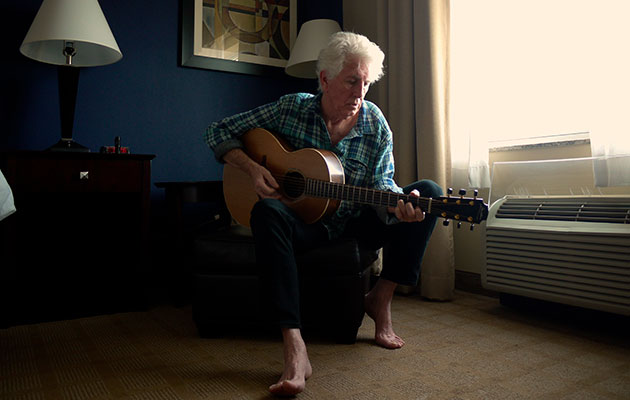Originally published in Uncut’s June 2016 issue
With a new album, This Path Tonight, and a new partner, Graham Nash is happier at 74 than he has been in years. “I’m in a very good place now,” he tells Uncut. “I am totally in love with this woman, and I’m [creatively] on fire, and I hope the album shows it.”
Here, looking back over his half century in music, Nash recalls other good times with his many illustrious collaborators – from cutting beat hits with The Hollies in London, to revelatory singing sessions with David Crosby and Stephen Stills in Joni Mitchell’s Californian living room.
However, Nash has found himself newly energised by This Path Tonight, only his sixth solo album, and is clearly looking forward to future work on his own. “There won’t be any more CSNY,” he explains, “and there won’t be any CSN, either. There’s no magic there any more. Well, we had a good run, a good 35, 40 years.”
Like us on Facebook to keep up to date with news from Uncut
________________________
THE HOLLIES
STAY WITH THE HOLLIES
PARLOPHONE, 1964
The Manchester quintet’s fab beat debut
GRAHAM NASH: Oh, my God, is this really 52 years old? Good Lord. Recording in Abbey Road was exciting, it was all brand new to us. Engineers wore white overalls and you’d have to tell [producer] Ron Richards to bring up the bass, then he would tell the engineer, who would then bring up the bass… This first album was done pretty quickly, in a couple of sessions. It was just our 45 minutes of dynamite that we used to do live: we did that twice and then the album was done. You’ll notice there are lots of cover versions on there, because that’s what everyone was doing. You’d have an uncle or a cousin who went to America and brought all the R’n’B records back, then the band would learn those. There was a lot of song-swapping. We used to do “Anna (Go To Him)” by Arthur Alexander – one night we were playing the Twisted Wheel in Manchester and The Beatles were at The Oasis. We all met up at this after-hours drinking club and I actually taught John Lennon the words to “Anna” [The Beatles recorded their own version for Please Please Me]. We weren’t pushing to do our own songs much then because we didn’t think we could – although there is one original on here, “Little Lover”, but that’s only because we were testing the water. We wrote all our B-sides, but they didn’t trust us with the A-sides, not until “We’re Through”. That was probably a good decision on Ron Richards’ part. He had a great set of ears, Ron. Don’t forget, he produced The Beatles’ “PS I Love You” as George Martin wasn’t there that day.
THE HOLLIES
BUTTERFLY
PARLOPHONE, 1967
On his last album with The Hollies, Nash was writing and singing the majority of the material
There were a lot of original songs on this album, a lot from me. I was trying to move forward. An album had been a collection of A-sides and a few B-sides, just to make money for the record company and for the band. Then Rubber Soul came out, and Brian Wilson said “holy shit” and came up with Pet Sounds and then The Beatles in retaliation wrote Sgt Pepper. By 1967, the concept of an album had changed drastically – it was no longer just a collection of A-sides and B-sides, but an actual journey that you could plot. I think we were coming into our own as songwriters then. I thought [contemporaneous single] “King Midas In Reverse” was a great record, but I guess it was seen as a bit complicated, so it got into the Top 30 when The Hollies were usually getting into the Top 10. Was I trying to push our sound? I think I may have pushed it a little too far! It wasn’t that I wanted to move on from The Hollies, it was that I’d heard me and David and Stephen sing. Once I’d heard that sound, you know, I wanted it. When that first happened, in Joni Mitchell’s living room, when we sang “You Don’t Have To Cry”, I knew instantly that I would have to go back to England and leave The Hollies and leave my money and equipment, and my family and my friends, and follow that sound – which is, of course, what I did. People thought I was fucking crazy, frankly. But I’d heard that sound and I wanted it.



